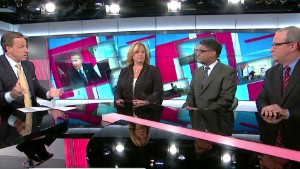Editor's note: David Frum, a CNN contributor, is a contributing editor at The Daily Beast. He is the author of eight books, including a new novel, "Patriots," and a post-election e-book, "Why Romney Lost." Frum was a special assistant to President George W. Bush from 2001 to 2002.
(CNN) -- Members of Congress demanded that President Barack Obama consult with them on Syria. They just got their wish. The responsibility for Syria policy will now be shared. Here are four questions that might be weighed wisely before the missiles fly:
1. What will it accomplish?
A war between Bashar al-Assad's regime, Hezbollah and Iran one side and al Qaeda- style Islamic radicals on the other is a fight in which the United States has no dog.
 David Frum
David Frum Hurting the Assad regime inevitably means helping the rebels. True, some of the rebels are nicer than other rebels. It's also true that the nasty rebels are the faction likelier to dominate if the Assad regime falls.
In June, the nasty rebels and the nicer rebels came to violence over control of strategic checkpoints in northern Syria. The conflict ended with the nasty rebels assassinating one of the top leaders of the nicer rebels and consolidating control over the disputed territory.
So much of the debate about Syria is a debate about "how"? We are in real danger of skipping over the more important questions: "Why?" and "For whose benefit?"
 On Syria, Obama faces uphill battle
On Syria, Obama faces uphill battle  King: Obama made a terrible mistake
King: Obama made a terrible mistake  Will GOP opposition galvanize Dems on Syria?
Will GOP opposition galvanize Dems on Syria? 2. What comes next?
A two-day barrage of cruise missiles will not tip the balance of the Syrian civil war against the Assad regime. It took seven months of bombing plus substantial military assistance to Libyan rebels to topple Moammar Gadhafi's friendless regime. Al-Assad has a tighter grip on power and more international allies.
Odds are that after the boom-boom ceases, the civil war will resume. Syrian government forces will likely continue to commit atrocities (although maybe next time by some means other than poison gas). The rebels will very likely continue to lose.
The world will have watched the Assad regime shake off an American punch -- and all the questions we face today about U.S. "credibility" will revive in more intense form.
The United States is contemplating cruise missile strikes today in large part because of the failure of prior interventions on behalf of the rebels: first food and medical aid, then communications devices and other battlefield support, then small arms. If this intervention fails to force al-Assad to quit, the next intervention will have to be bigger again.
3. What will it cost?
A Syria campaign is being advertised as comparatively cheap in money and American lives. We're promised "no boots on the ground." But there's another cost in danger of being overlooked: the opportunity cost.
The president, the secretary of state, the secretary of defense and other top officials have only so much time and energy. If they commit to resolving the Syrian civil war, inevitably they give second shrift, or third shrift, or worse to many other concerns of arguably greater importance to the region and the world.
Egypt, for example, seems to be heading toward the same civil strife as Syria. Who is developing the plan for helping to prevent that outcome? How much high-level support and attention are they getting?
4. Is there another way?
Obama administration officials argue a strike against Syria will deter Iran. But firing cruise missiles at army facilities in Syria seems a very roundabout method of stopping a nuclear program in Iran. Some may hope that the United States is drawing Iran into a protracted, expensive proxy war. But the United States already has two anti-Iran proxy wars in inventory, Afghanistan and Iraq, and neither has gone well.
What has gone well, by contrast, is the U.S. campaign of economic pressure on Iran. Who would have dared predict in 2002 that Iran would still lack a nuclear weapon 11 years later and without a U.S. military attack? Yet so it has happened.
There is a lesson contained in that success, and it is: "priorities, people."
If you want to deal with Iran, deal with Iran. And if you want not to be drawn all the way into a Syrian civil war between factions none of them friendly to the United States, then the best way to avoid being drawn is: don't take the first step. And if you have already inadvisedly taken the first step, at least beware the second, third and fourth.
Follow @CNNOpinion on Twitter.
Join us at Facebook/CNNOpinion.
{ 0 comments... read them below or add one }
Post a Comment